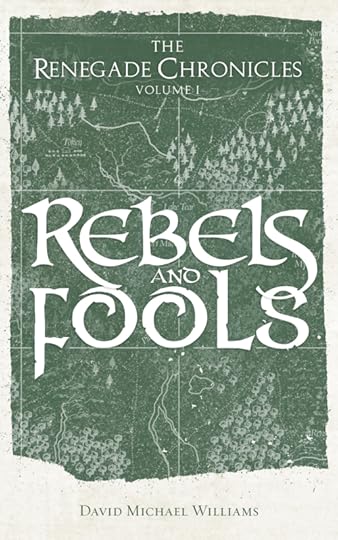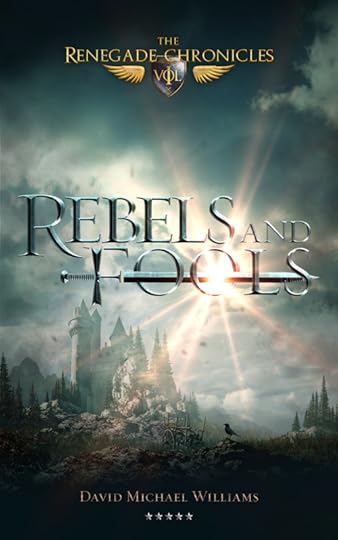David Michael Williams's Blog: One Million Words (or less), page 13
January 7, 2016
Putting the pretty on it
There’s nothing too glamorous about text on a page.
The beauty of words is that they paint pictures in the mind, but when you consider the typically black-and-white composition of lines, dots, and curves on an otherwise blank backdrop, well, words themselves are nothing to write home about.
Having worked in marketing for the past nine years, I’ve discovered there are few things as exciting as unveiling the visuals for a project. Forget the spreadsheets and other planning documents, the copywriting, and the technological components that may follow; the day a client sees her new logo or his new homepage for the first time is by far the most impactful point in the project.
I’ve been known to use the phrase “putting the pretty on it” when describing the evolution from mere words to engaging imagery. The moment there is color and shape and form, that’s when a project starts to feel real.
I’m no exception to the phenomenon, which is why I was so eager earlier this week to meet with the artist working on the covers for The Renegade Chronicles—and to preview three possible concepts.
I am delighted to share the fruits of his labor with you not only because the cover concepts make this whole enterprise feel “more real” to me (and, hopefully, to my future readers as well), but also because very soon, I will have to tell him which concept to finalize for Rebels and Fools and adapt for Heroes and Liars and Martyrs and Monsters (the other two books in the series). I need to choose the winner, but before I do, I’d love to solicit your insights.
In other words, please judge my book by its (prospective) cover!
How can you help?
Take a look at the potential packages for my forthcoming fantasy novels and answer these questions in the comments section below:
Which of the three concepts would most likely prompt you to purchase the book?
What tweaks, if any, would you make to your favorite cover concept?
For each of the three concepts, what type of story would you expect to find behind the cover?
As always, I appreciate any and all feedback immensely!



And the winner is…


December 10, 2015
A different class of writing
Spending time with young people can make you feel old, but it can also make you feel young, too.
I had the pleasure of talking with students at Waupun High School yesterday. My mission: to share my educational background, professional writing experiences, writing advice, and tips for getting published with the fledgling writers—in 45 minutes or less.

Despite my best efforts, I might have uttered “when I was your age” at least once.
In all seriousness, it was a very casual environment, and even though I did most of the talking, I couldn’t help but be a little inspired as we went around the circle, and the students told of their current projects and future ambitions.
Because I’ve been up to my (pointed) ears in editing a certain fantasy trilogy, I hope you’ll forgive me for taking a shortcut here by repurposing my notes from yesterday’s spiel—quasi-transcripts, if you will.
Hopefully, you’ll find a nugget or two of wisdom regardless of where you are on the path to authorhood.
My story
I started writing in earnest in high school. My fantasy tales bore a resemblance to the books I was reading at the time: DragonLance, Forgotten Realms…you know, books with dragons on the covers. Mostly, I engaged in world-building exercises and episodic storylines, though there was at least one false start to a novel
By senior year, I knew I wanted to be a novelist. At UW-Fond du Lac, I signed up for an independent study writing course. It turned out to be a one-on-one with a professor, where I delivered a chapter for her to critique each week. This was one of the most valuable college courses I ever took, and I learned an awful lot about the basics of storytelling, the importance of word choice—and how to meet deadlines.
In those two years, I wrote two-thirds of what would come to be Volume 1 of The Renegade Chronicles. When I transferred to UW-Milwaukee, I completed the first draft and then rewrote the entire manuscript from scratch senior year since my writing style—not to mention skill level—had dramatically changed since freshman year.
I submitted chapters of my book for various writing workshops, and peer review also proved incredibly valuable. (Though in one class, I had to convince the professor that genre fiction had merit before we were allowed to present fantasy, sci-fi, romance, etc.)
Meanwhile, I took as many literature and linguistics classes as I could. Beyond English courses, I signed up for philosophy, psychology and a ton of history courses. An all-too-common adage dictates one should write what one knows. Ergo, the more you know, the more you can write about.
I somewhat regret I didn’t take any journalism, marketing, or radio/TV/film classes. At the time, I wanted only to write fiction, so none of those related disciplines appealed to me. Then again, I picked up many of those skills later in life.
After graduating with a bachelor’s degree in English with an emphasis on creative writing, I taught for a year in China, where I had my favorite job title to date: foreign expert. While overseas, I wrote a sequel. I also tried to publish a short story I had written in college (to no avail) and researched agents to represent my fantasy novels.
When I returned to the U.S., I got cracking on Volume 3—while racking up rejections for Volumes 1 and 2.
I was fortunate to find an entry-level position at a newspaper. As a news clerk, I mostly was responsible for formatting lists, such as marriage licenses and school lunch menus. (Have you ever questioned the proper spelling of “tri-tater”?) I typed up letters to the editor, too.
But I also got to do some proofreading and wrote an article here and there. In less than I year, I was promoted to entertainment writer and editor. I picked up a slew of skills in the newsroom—writing and proofing using AP style, headline writing, lead writing, pagination/layout, the basics of photo editing.
Most importantly, I learned the virtues of brevity.
After a few years, I went to the “dark side”—public relations and marketing. At UW-Oshkosh, I wrote press releases, coordinated interviews with faculty and staff, wrote articles for the online news publication and the alumni magazine, became a wiz at Word Press and other content management systems, taught myself project management, and supervised student interns.
I learned even more when I became an account executive at BrownBoots Interactive, including more website skills, search engine optimization (which injects a lot of science into the art of writing), writing for TV and radio commercials, managing multi-channel marketing campaigns, estimating on projects, blogging, and much more.
That’s right, the guy who couldn’t care less about journalism, public relations, and marketing in college grew to appreciate them and, if I do say so myself, excel at them.
But my dream has always been to be a novelist…
About 10 years ago, I joined Allied Authors of Wisconsin. Because I couldn’t get an agent to bite on The Renegade Chronicles, I decided to go outside of my comfort zone and wrote a sci-fi novel that got very good feedback from my beta readers. An agent, who is also a member of AAW, elected to represent If Souls Can Sleep.
And because I didn’t learn my lessons with The Renegade Chronicles, I wrote a sequel before selling the first one.
My wife and I wrote a children’s chapter book to test the waters with self-publishing. (More on that here and here.) But between a full-time career and family obligations, I always felt as though my fiction got short shrift.
Earlier this year, I decided I to take a chance and put my fiction on the front burner. I transitioned to a new role at the agency to allow for larger pockets of time for writing and editing fiction. I created a business plan and am committed self-publishing The Renegade Chronicles in 2016.
My long-term goal—my dream—hasn’t changed remains the same: I want to make a living writing fiction.
Writing advice
There’s no shortage of writing advice out there (and sometimes tips contradict). But here is some advice my mentors gave me “back in the day”:
Margaret Weis: “Treat your writing like a job. Write on a schedule.”
R.A. Salvatore: “If you can quit, then quit. If you can’t, you’re a writer.”
Tom Ramirez: “The first one million words are just finger exercises.”
I’ll add a few of my own observations to the mix:
Embrace a variety of life experiences—everything is fodder for your writing.
Learn as much as you can about the industry and gain related skills. Even traditionally published authors have to be business-minded marketing experts.
Write as many different kind of things as you can because you might be surprised at what you’re good at…and what you might enjoy.
Don’t turn your nose up at any writing gig—even if it’s the company newsletter—because everyone has to start somewhere.
Get feedback from others (e.g., writers groups, online forums) but realize that not all critiques are created equal. Not everyone is your target audience, and ultimately, it’s your story.
Always write what you love and do whatever you can to hold onto that passion.
Most importantly, don’t give up.
Tips for getting published
A lot has changed since I was in high school. Back then, you were supposed to write and publish short stories (which I sucked at), and you couldn’t hope to publish a novel without an agent. Also, self-publishing was for losers, and vanity presses that preyed on amateur writers made it expensive, too.
Today, self-publishing is both respectable and profitable. Print-on-demand means publishing a book is relatively inexpensive, though there are outside costs like proofreading and cover design. The biggest challenge is getting noticed above the noise.
As someone who is still on the path to publication, I don’t have any surefire secrets for becoming a bestseller. I do, however, have a couple of tips:
1. Don’t publish before you’re ready. After more than a decade between drafts, I’m now hacking apart The Renegade Chronicles, and they’ll be much better for it. And do your homework to avoid wasting your time…or getting sued.
2. Don’t be afraid to take chances. By the time you’re ready to publish a novel or a comic book or your memoirs, a lot is going to have changed. It’s never been a better time to be a writer, but it’s also the Wild West of publishing right now. If you want to get noticed, you have to experiment.
If you follow the crowd, you’ll always be behind.


October 27, 2015
One Million Words…and more
I’ve written some pretty strange things over the years.
Just last week, I wrote the text for a sell sheet that compares website services to automobile maintenance—despite knowing next to nothing about cars. Years ago, I scripted a mock press conference starring the chancellor of a public university and the ice-cream-cone mascot of a local burger franchise. Once I even dedicated a newspaper column to the topic of dust.
Subject matter aside, I’ve had the privilege of producing a wide array of written works throughout my professional life, including journalistic articles, press releases, text for various marketing brochures and websites, ad copy, scripts for television and radio commercials, and a job posting modeled after the inscription on Tolkien’s One Ring of Power.
But few things pushed me farther outside my comfort zone than the business plan I recently put together.
That’s right, soon One Million Words will be more than just an informal brand for my fiction. In the next few months, I plan to start my own business to better coordinate my writing and publishing efforts.
Last month, I struggled with the question “What now?” I couldn’t decide whether I wanted to jump into the next book of my current series, revisit some of my older works, or explore something completely new. Before I could determine my next steps, I needed to map out my goals. And if I were really going to treat my writing like a business, the numbers had to have a say in the solution.
In other words, if I wanted to survive, I needed a source of income.
While I remained (and still remain!) hopeful my agent will be able to sell the first two books of The Soul Sleep Cycle, I couldn’t bank on that—given how slowly the traditional publishing industry moves.
Which meant I needed to find another revenue stream in the meantime.
The Renegade Chronicles—a sword-and-sorcery series I wrote years ago—was the obvious low-hanging fruit. My goal is to self-publish those books in paperback and as e-books in the first quarter next year to maximize my sales window in 2016.
As much as I’d love to plow forward into Book 3 of The Soul Sleep Cycle, I now find myself contending against an admittedly aggressive deadline. There’s a chance that in between editing and proofing The Renegade Chronicles, commissioning cover art, refining my marketing plan, and publishing that trilogy, I’ll be able to crank out a character profile or two as well as a chapter outline for If Dreams Can Die, but if not, it will have to wait until April.
These past few days, I’ve been spending as much time staring at spreadsheets as Word documents. As much as I crave the chance to sink my teeth into something more creative than business planning and editing, the left side of my brain thrives on organizing tasks and timelines.
It’s a lot of work—and a far cry from my carefree approach to fiction back when I first penned The Renegade Chronicles—but no one ever said living the dream would be easy.
Truth be told, I’m quite pleased with how the business plan turned out (and sincere thanks to Denise Grover Swank, whose business plan at The Writer’s Guide to E-Publishing served as my model). While it’s intimidated to see a list of 50-plus to-dos staring back at me when I open my spreadsheet, it feels damn good to have a destination.
And now I must return to a task that’s at least as daunting as writing a business plan: coming up with better titles for the three Renegade Chronicles books.


September 22, 2015
Pondering my next writing project
My favorite questions tend to start with “what if.” Lately, however, this writer has been asking himself, “What now?”

Source: Ernie & Katy Newton Lawley, http://www.flickr.com/photos/lawley/59402926/ via Wikimedia Commons
Ever since I started plotting out If Souls Can Sleep nearly nine years ago, I’ve had a clear path in front of me when it came to my fiction. The road wasn’t always a straight line by any stretch—for instance, my wife and I wrote a children’s book in between the first and second draft of If Sin Dwells Deep—but I always had more tasks than time to complete them.
Until last week.
With the first two installments of The Soul Sleep Cycle in my agent’s hands, I find myself at an unexpected crossroads, where past, present, and future compete for my attention. And for the life of me, I can’t decide which path is the most prudent.
Option 1: The Past
Once upon a time, I wrote a sword-and-sorcery fantasy series called The Renegade Chronicles. I couldn’t get agents or publishers interested. Rather than invest more time in fixing it, I decided to try something completely different. The result was If Souls Can Sleep.
For many years, I’ve had the notion to go back and self-publish the TRC. After all, just about every article I’ve ever read about becoming a profitable author espouses the virtues of having a large number of titles for sale. Some of those same sources heavily imply that quantity trumps quality…
Then again, just as many advice columns say that an author’s No. 1 marketing tool is a well-crafted manuscript—in other words, the best story you can write.
(And what to do when writing tips contradict?)
Last week, I reread the first third of Book 1 of the TRC to see just how much dust had collected over the past 14 years. While it wasn’t as cringe-inducing as a feared it would be, one thing was clear: that book, along with the other two, would need copious edits.
The best-case scenario would be a performing a series of substantive edits on all three books, cutting out superfluous text, fixing awkward words and phrases, and eradicating all types of typos. In addition to removing excess, I detected a dearth in setting and sensory details throughout. The prologue was rubbish, too.
Pros for revisiting the past
Repairing something that’s already written is bound to be easier than starting anew.
This is the fastest way for me to publish several books in one fell swoop—and, hopefully, start generating revenue.
I invested seven-plus years in TRC, so dedicating another six to twelve months seems like a small price to pay in order to potentially profit from all that work.
If TRC finds an audience, I have a slew of storylines saved up for that particular universe.
Cons for revisiting the past
After so much time away, I’m not particularly passionate about this project.
Even with substantive edits, the final product will not reflect my current skill level.
Therefore, it will take an awful lot of willpower to refrain from completely rewriting the series, which would be quite time consuming.
More editing? It’s been more than three years since I wrote a new book—or, more precisely, co-wrote The Pajamazon Amazon vs The Goofers Twofers—and I’m itching for the chance to jump back into the more creative aspects of creative writing.
Option 2: The Present
With at least one book left to write in The Soul Sleep Cycle (and hopefully a few more), I’d be lying if I said I wasn’t eager to wrap up the major story arc that I started back in 2006. However, I’m reluctant to invest the time in Book 3 before I see whether the first two garner any interest—and sales—either via traditional publishing or indie publishing.
To forge ahead or take a break from the series—that is the question.
Pros for living in the present
I already have a pretty good idea of what this book will be about and what needs to happen before the end.
Having just finished major edits to If Sin Dwells Deep and minor edits to If Souls Can Sleep, the complexities of the story are still fresh in my mind.
I’m still very excited about this series, and, honestly, I can’t imagine not writing this book at some point—if only for closure.
If traditional publishers don’t buy the trilogy, I’ll have three books ready to self-publish simultaneously. (Hey, it works for Netflix.)
I’m confident that the project would push me creatively and that I’d be proud of the final product.
While not as easy as editing TRC, writing Book 3 of The Soul Sleep Cycle would still be simpler than coming up with a completely new idea for a novel.
Cons for living in the present
If ISCS and ISDD don’t prove profitable—regardless of whether I or a traditional publisher sell them—then spending time writing the next book in the series would be rather pointless. (See also: The Renegade Chronicles.)
Even with my new writing schedule, it could take me a couple of years to plot out this story, write it, and then edit it.
Option 3: The Future
I don’t know about other writers, but I always have a slew of story ideas rattling around my gray matter. I jot down some of these story starters in a Word file. In most cases, a few paragraphs are enough to placate that which is threatening to distract me from my current project. Such was the case with a young adult time-traveling tale, a twist-filled take on a traditional fairy tale, and a book about zealots bent on triggering Armageddon.
But then there are stories that can’t be so easily exorcized. For more than a year, I’ve found my mind wandering to a new novel—or series—codenamed “Changelings.” Last week, I finally relented and wrote a few pages about a potential plot and the people to populate it.
Could this be my next novel?
Pros for embracing the future
Jumping into a brand-new book would be undeniably energizing, not to mention fun. (I haven’t written a first draft a story since “Ghost Mode” in 2013!)
I already have a viable avenue to explore: Changelings.
Cons for embracing the future
I have no idea whether any of my ideas, including Changelings, will bear fruit.
Even if I were to write a complete manuscript for Changelings, there’s no guarantee it would be publishable.
Any new project will require plenty of planning—a process in which I can too easily lose myself.
Planning aside, starting afresh will surely be the most time-consuming approach. If my goal is to publish something pronto, this option is out of the question.
Of course, there are other possibilities. I could focus on non-fiction, repurposing some of my old Generation Why? columns or mining this blog for writing-related topics in order to make my self-publishing debut. Or I could give into one of my friend’s urgings and try my hand at a biography of some fascinating historical figure.
But the fact is my passion for writing has always focused on fiction.
“What next?” has almost never been a problem for this writer. Perhaps I should spend a little time exploring past, present, and future—each in turn—and see which project captures my soul. Then again, I suspect I already know where my heart lies.
Perhaps that’s another advantage of “living the dream.”


One Million Words (or less)
- David Michael Williams's profile
- 35 followers



